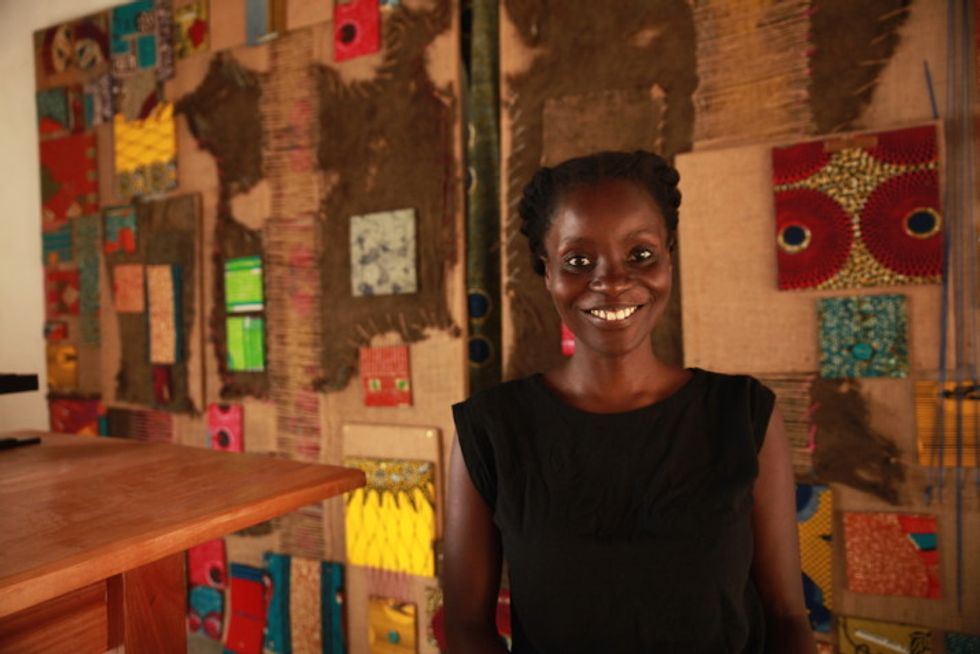#Goals: Nana Oforiatta-Ayim Is the Ghanaian Creative Preserving Africa’s Artistic Past
For our last installment of #Goals, we speak to Ghanaian arts historian, writer and filmmaker Nana Oforiatta-Ayim about her efforts to preserve Africa's artistic past, and assure its future.

During the month of August, we’ll be highlighting aspirational folks who are setting major #goals and achieving them, and asking them to share their stories and insight to help motivate us all to “live our best lives.”
These athletes, artists, fashionistas, scholars, entrepreneurs, and more, are a reminder to us all, that dreams are valid!
Previously, we spoke to Nigerian mental health advocate Funmilade Adeniyi-Taiwo, for our final installment, we speak with Ghanaian art historian Nana Oforiatta-Ayim. Read our conversation below.
Ghanaian art historian, writer, and filmmaker Nana Oforiatta-Ayim is one of the foremost architects of the contemporary African arts scene. As the creative director of Accra’s Gallery 1957 and director of the cultural research initiative, ANO, Oforiatta-Ayim is building a flourishing arts ecosystem. OkayAfrica spoke to Oforiatta-Ayim about her efforts to preserve Africa’s artistic past and shape its future.
Akinyi Ochieng for OkayAfrica: When did you first discover what you wanted to do?
Nana Oforiatta-Ayim: From a very young age, I knew I wanted to write, I’ve always been an avid reader, and writing became a way to make sense of the world. I became interested in film after working with filmmaker Chris Marker on a film Les Statues Meurent Aussi, which I helped translate from French into English. I entered the world of Art History after my first degree in politics and Russian. At the time, although I was working for the United Nations, my interests centered around arts and culture and most of my friends were artists, I realized that the arts were for me a more potent tool for transformation than politics. I got more and more into the idea of changing narratives through art.
How do you think your background in politics and Russia has affected the way in which you view your work now?
I’m interested in the way that art can transform societies. When I studied Russian [history], I was mostly interested in the Russian Revolution, the revolutionary nature of Russian literatures and arts. I think we’re going through something similar here in Accra right now.
Right now, in Accra, there are new manifestations of art and new communities in the process of formation. That dynamism and conversation is rapidly coming together to create a crucible, a catalyst for change, that mirrors our economic and political changes.
You’re a quintessential "Jill of all Trades." You’re a writer, an art historian, a filmmaker—do you think that being involved in all these mediums has detracted from your work, or has it enhanced its quality?
It makes life harder in that you never get to rest. When you finish with one work, you immediately go to another. It’s hard to juggle three or four different things, and in a way, I wish I was a one-activity type of person, because my mind and body are never at rest. At the same time, each realm somehow enriches the other and gives each more dimension.
A post shared by OkayAfrica (@okayafrica) on
What is your proudest accomplishment to date?
Getting a book deal for my novel, The God Child, a coming of age story that will come out next year and will be published by Bloomsbury.
You’ve racked up numerous accolades from the 2015 Art & Technology Award from the Los Angeles County Museum of Art, the 2016 AIR Award, and were named by OkayAfrica as one of 12 African women making history. Has this recognition changed you or the way you perceive your work?
I wouldn’t say it’s changed me. It’s nice, of course, to have some degree of recognition—some degree of acknowledgement, that your work resonates in the world. But I don’t go to bed thinking about what people said about my work today. I go to bed thinking of what I need to do next. I don’t think I have an external impetus so much as an internal one. Whatever happens on the outside, I’ll still be driven by the same thing on the inside.
How do you identify which projects you feel compelled to develop and the ones that are better left to others?
I’m still figuring that balance out, to be honest. Especially with ANO, there’s lots of things I’m doing right now that I should leave to others or that I’m trying to find others to do much better than I could myself. The cultural institution building here in this country is still so new and young. It’s not like London where you can find a person to do this or that, you know where to go. I think we’re still forming who we are and what we’re doing, so a lot of people end up doing a lot of it themselves. So I don’t have the luxury to leave things to others right now, but we are trying to create that cultural infrastructure.
The question of drive is interesting because many of your projects, like the Cultural Encyclopedia, have long incubation periods. How do you sustain your vision for work with a long horizon?
With the Cultural Encyclopedia, for example, it’s been going for many years. I just think it’s something that’s necessary. Coming from the African continent, being a creative, and having a kind of vision of how things can be better is what you hold on to and what gives you the energy to continue despite all the obstacles day-in, day-out. You’re born in this certain context, so you have to do the best that you can to make it a better place. That’s what drives me. We’re each given our gifts and abilities, and with the things that I’m doing, I’m just trying to channel those in order to have the best possible impact I can while I’m here.

